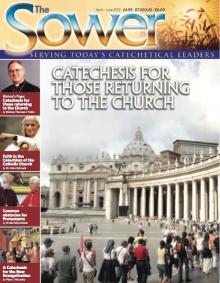A Year of Faith. A period of focus and of new evangelisation. A Synod, later this year, devoted to the question of the transmission of the Faith. Many initiatives are already beginning to emerge in response to this call from the Holy Father to prepare for a new springtime in the Church. What are some of the important things that the Church wants us to remember as we enter this time?
The Year of Faith is a time of grace, since faith and its transmission is, above all, a Divine work. It is the work and gift of the blessed Trinity. The Father wants his children to return home. The journey home is made, not by intensifying our activity - for ‘we do not come to him who is everywhere present by moving from place to place’[i] - but through our docile cooperation with God’s grace which is superabundant.
The Year of Faith is a time for adoration. For ‘we are on a road which is not a road from place to place but a road of the affections, which was blocked, as if by a thorny hedge, by the malice of our past sins’.[ii] It is only grace that can unblock the road, enabling and supporting the steps of faith, hope and love to be taken. It is in prayer that this truth is learned most clearly, and therefore adoration stands at the heart of mission and of new evangelisation. We are not asked to be especially busy in the Year of Faith. It is rather a Year when we can seek and find Jesus in the Temple, busy about his Father’s business, the business of leading home his brothers and sisters.
The Year of Faith is a time for our deeper insertion into the living Tradition of the Church. Tradition stands at the heart of handing on the Gospel, today as everyday. The transmission of the Faith takes place in the context of a hermeneutic of continuity, a retrieval of the old for the sake of what is needed today. Transmission of the Faith is always ressourcement as well as aggiornamento. ‘New’ evangelisation is not a rejection of the old. In the Church, ‘new’ never implies a break with the ‘old’. Tradition is ever-ancient, ever-new.
The Year of Faith is a time for faith to be transmitted in its fullness. The Church is content only with this. Because her heart is charity, the Church wants to give all that she has to those who seek. She gives incrementally, of course, like any good mother, because the human heart must expand before it is large enough to receive all that is in the Father’s plan. Evangelisation therefore entails an initial step, a first step of basic proclamation. But it does not stop there. The work of evangelisation does not seek a return to a supposedly ‘simple Gospel’. After initial conversion and the basic proclamation there is a second step in the process of evangelisation, for conversion is an ‘uninterrupted task’.[iii] This is the call to the steady commitment of being willing to study, live and hand on the faith in its entirety, systematically and organically. Evangelisation needs schools of adult faith as the centrepiece of its work. And this second step leads to a third – which is really just a way of saying both that the depths of God are unfathomable and also that grace is unstoppable - for every aspect of human life and culture is to be formed and informed by the Faith. ‘Behold, I make all things new.’[iv]
The Year of Faith is a time for new evangelisation. ‘New’ evangelisation is needed for the sake of ‘old’ evangelisation. The Church’s emphasis on new evangelisation, upon mending the ecclesial ‘fabric’[v] of the ancient Christian cultures, is not replacing the traditional focus the Church has always maintained on the missio ad gentes. Rather, new evangelisation serves that traditional missio. New evangelisation is needed for the sake of the Church’s mission to those who have never before heard the Gospel. The newer Christian communities, perhaps only recently founded or only several generations old, need the ancient churches to awaken from their sleep, to awaken to the riches that lie around them, in their cultures and in their communities, so that these riches can be shared with others. Evangelisation depends upon there being mature Christians who are willing to evangelise.[vi]
The Year of Faith is a time for personal renewal. New evangelisation asks for renewed persons. The priority is the person. New methods are also called for, and they are flowing in abundance in our time. But the acquiring of new methods and techniques is never a substitute for the joy of personal renewal. Nothing in the end takes one beyond the centrality of receiving and transmitting the Faith through acts of self-gift, because that which we receive in faith is the Self-gift of God himself, the Gift of the Love which made the stars and which seeks our love in return.
NOTES
[i] Augustine, De Doctrina Christiana I, X, 10.
[ii] De Doctrina Christiana I, XVII, 16.
[iii] CCC 1428.
[iv] See Paul VI, Evangelii Nuntiandi 18-20.
[v] See John Paul II, Christifideles Laici 34.
[vi] See the continuing teaching in Christifideles Laici 35.
This article is originally found on page 4 of the printed edition.
This article is from The Sower and may be copied for catechetical purposes only. It may not be reprinted in another published work without the permission of Maryvale Institute. Contact [email protected]

















